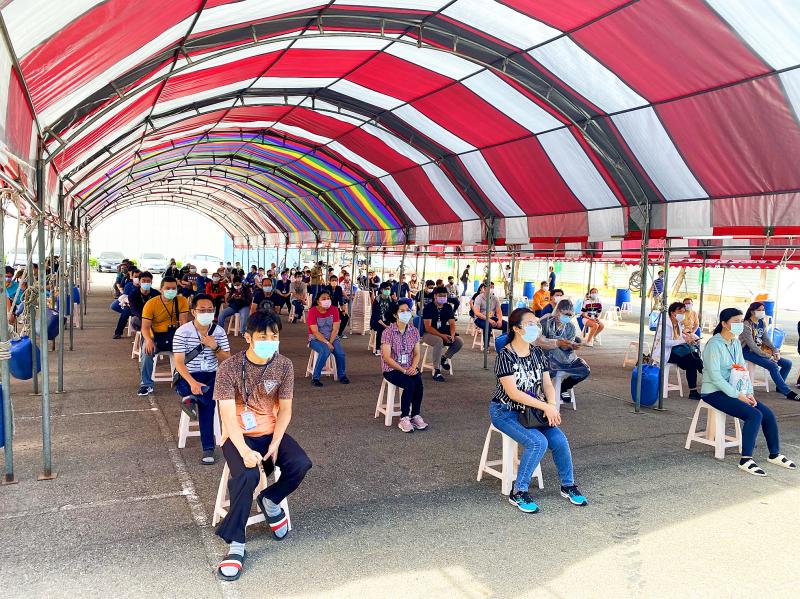King Yuan Electronics Co (京元電子) yesterday said it would shut down its factories for 48 hours to be thoroughly disinfected amid concern over COVID-19 infections linked to its manufacturing campus in Miaoli County.
As of yesterday, 67 King Yuan employees, mostly migrant workers from the Philippines, had tested positive for the disease after a large-scale rapid screening program was launched for the company’s 7,300 workers.
King Yuan, a chip testing and packaging service provider, had resisted halting production for fear of disrupting supply, kindling anger among employees and nearby residents.

Photo provided by King Yuan Electronics Co via CNA
King Yuan, headquartered in Hsinchu City, counts handset chip supplier MediaTek Inc (聯發科), display driver IC maker Novatek Microelectronics Corp (聯詠) and international corporations among its customers.
The production disruption would reduce output and revenue alike by between 4 and 6 percent this month, as its six plants in Hsinchu, and Miaoli’s Tongluo (銅鑼) and (竹南) Jhunan townships would shut down.
King Yuan posted NT$2.86 billion (US$103.17 million) in revenue last month, expanding 10.72 percent from NT$2.58 billion in May last year. That brought the company’s revenue in the first five months of this year to NT$12.17 billion, up 8.87 percent year-on-year.
The shutdown would not affect its financial performance for the full year this year, the company said.
King Yuan was the world’s No. 8 chip testing and packaging service provider last quarter, with revenue of NT$267 million, a tally market researcher TrendForce Corp (集邦科技) showed.
That gave King Yuan a market share of 3.7 percent.

GROWING OWINGS: While Luxembourg and China swapped the top three spots, the US continued to be the largest exposure for Taiwan for the 41st consecutive quarter The US remained the largest debtor nation to Taiwan’s banking sector for the 41st consecutive quarter at the end of September, after local banks’ exposure to the US market rose more than 2 percent from three months earlier, the central bank said. Exposure to the US increased to US$198.896 billion, up US$4.026 billion, or 2.07 percent, from US$194.87 billion in the previous quarter, data released by the central bank showed on Friday. Of the increase, about US$1.4 billion came from banks’ investments in securitized products and interbank loans in the US, while another US$2.6 billion stemmed from trust assets, including mutual funds,

AI TALENT: No financial details were released about the deal, in which top Groq executives, including its CEO, would join Nvidia to help advance the technology Nvidia Corp has agreed to a licensing deal with artificial intelligence (AI) start-up Groq, furthering its investments in companies connected to the AI boom and gaining the right to add a new type of technology to its products. The world’s largest publicly traded company has paid for the right to use Groq’s technology and is to integrate its chip design into future products. Some of the start-up’s executives are leaving to join Nvidia to help with that effort, the companies said. Groq would continue as an independent company with a new chief executive, it said on Wednesday in a post on its Web

JOINT EFFORTS: MediaTek would partner with Denso to develop custom chips to support the car-part specialist company’s driver-assist systems in an expanding market MediaTek Inc (聯發科), the world’s largest mobile phone chip designer, yesterday said it is working closely with Japan’s Denso Corp to build a custom automotive system-on-chip (SoC) solution tailored for advanced driver-assistance systems and cockpit systems, adding another customer to its new application-specific IC (ASIC) business. This effort merges Denso’s automotive-grade safety expertise and deep vehicle integration with MediaTek’s technologies cultivated through the development of Media- Tek’s Dimensity AX, leveraging efficient, high-performance SoCs and artificial intelligence (AI) capabilities to offer a scalable, production-ready platform for next-generation driver assistance, the company said in a statement yesterday. “Through this collaboration, we are bringing two

Even as the US is embarked on a bitter rivalry with China over the deployment of artificial intelligence (AI), Chinese technology is quietly making inroads into the US market. Despite considerable geopolitical tensions, Chinese open-source AI models are winning over a growing number of programmers and companies in the US. These are different from the closed generative AI models that have become household names — ChatGPT-maker OpenAI or Google’s Gemini — whose inner workings are fiercely protected. In contrast, “open” models offered by many Chinese rivals, from Alibaba (阿里巴巴) to DeepSeek (深度求索), allow programmers to customize parts of the software to suit their